 As a passionate hunter, Brillat-Savarin enjoyed traditional midday luncheon trysts or haltes de chasse. he describes the gathering in “Meditation XV” in Physiologie du Gout, or The Psychology of Taste. According to French usage, the halte de chasse is not...
As a passionate hunter, Brillat-Savarin enjoyed traditional midday luncheon trysts or haltes de chasse. he describes the gathering in “Meditation XV” in Physiologie du Gout, or The Psychology of Taste. According to French usage, the halte de chasse is not...
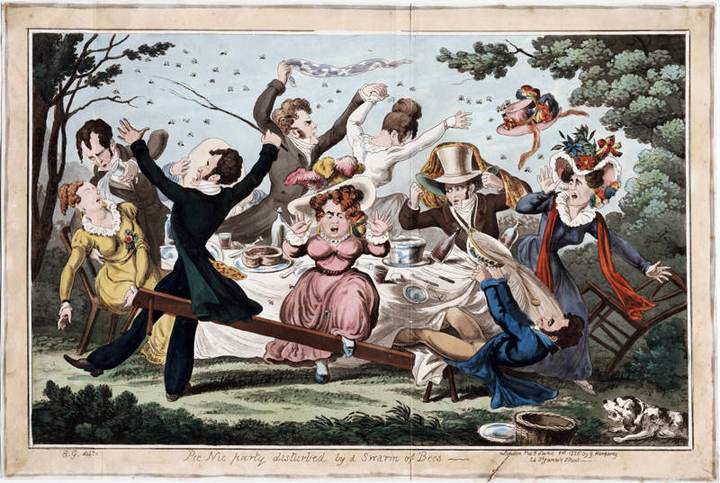 Five couples picnicking on the grass are upset by a swarm of bees. Their table is in disarray as people run helter-skelter; hats fly, tempers flare, and a dog barks. A man pours water on a fainting woman that misses her mouth but not her breasts. Round up the usual...
Five couples picnicking on the grass are upset by a swarm of bees. Their table is in disarray as people run helter-skelter; hats fly, tempers flare, and a dog barks. A man pours water on a fainting woman that misses her mouth but not her breasts. Round up the usual...
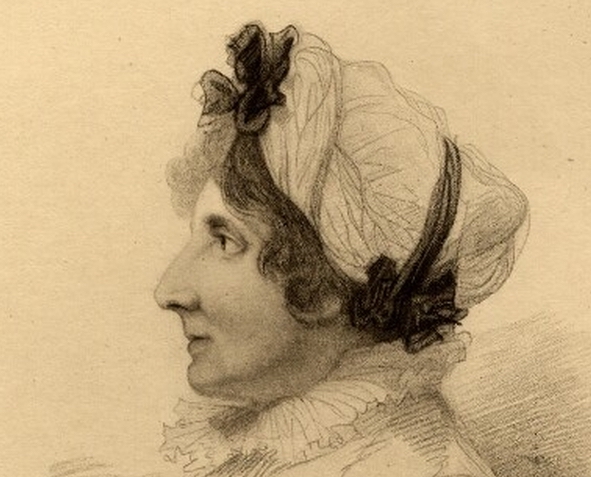 Barbauld’s etiquette book A Legacy for Young Ladies Consisting of Miscellaneous Pieces in Prose and Verse was an important social resource. Like Miss Manners or Emily Post, Barbauld is sure that what she has to say is correct. Barbauld’s explanation of “pic nic” then...
Barbauld’s etiquette book A Legacy for Young Ladies Consisting of Miscellaneous Pieces in Prose and Verse was an important social resource. Like Miss Manners or Emily Post, Barbauld is sure that what she has to say is correct. Barbauld’s explanation of “pic nic” then...
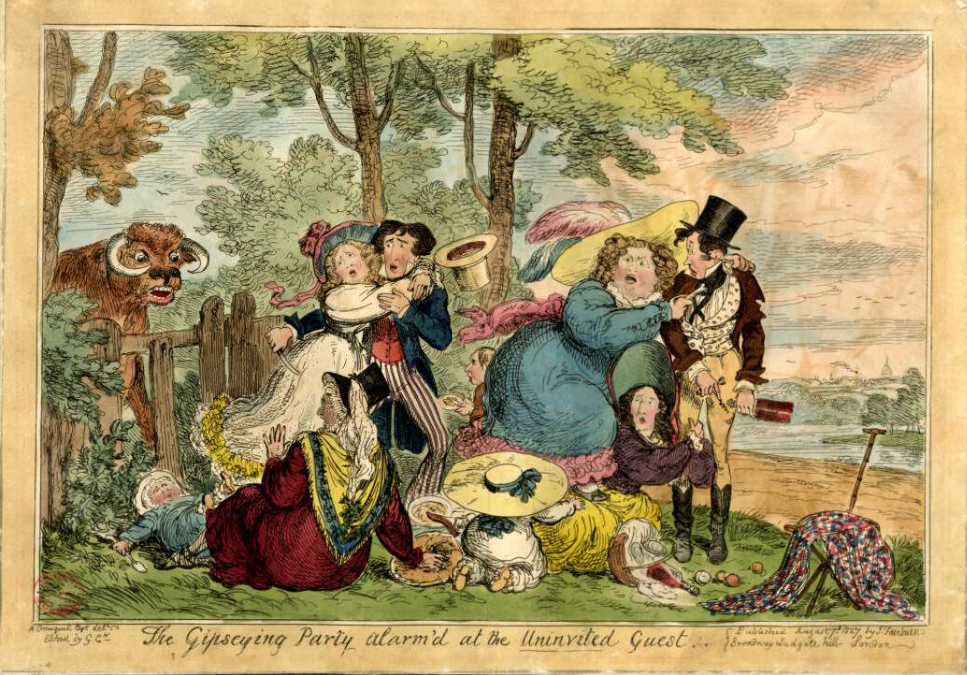 Another picnic ruined, etc., etc. See George Cruikshank. The Gipseying Party Alarm’d at the Uninvited Guest (1827), engraving. London: John Fairburn, 1827....
Another picnic ruined, etc., etc. See George Cruikshank. The Gipseying Party Alarm’d at the Uninvited Guest (1827), engraving. London: John Fairburn, 1827....
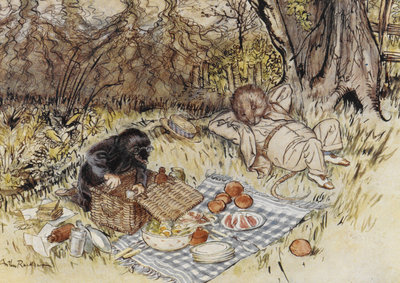 Grahame’s picnic in The Wind in the Willows (1908) is a wonder. What child (or adult) could ever conceive of a picnic for one eating basket full of “cold chicken. ....
Grahame’s picnic in The Wind in the Willows (1908) is a wonder. What child (or adult) could ever conceive of a picnic for one eating basket full of “cold chicken. ....
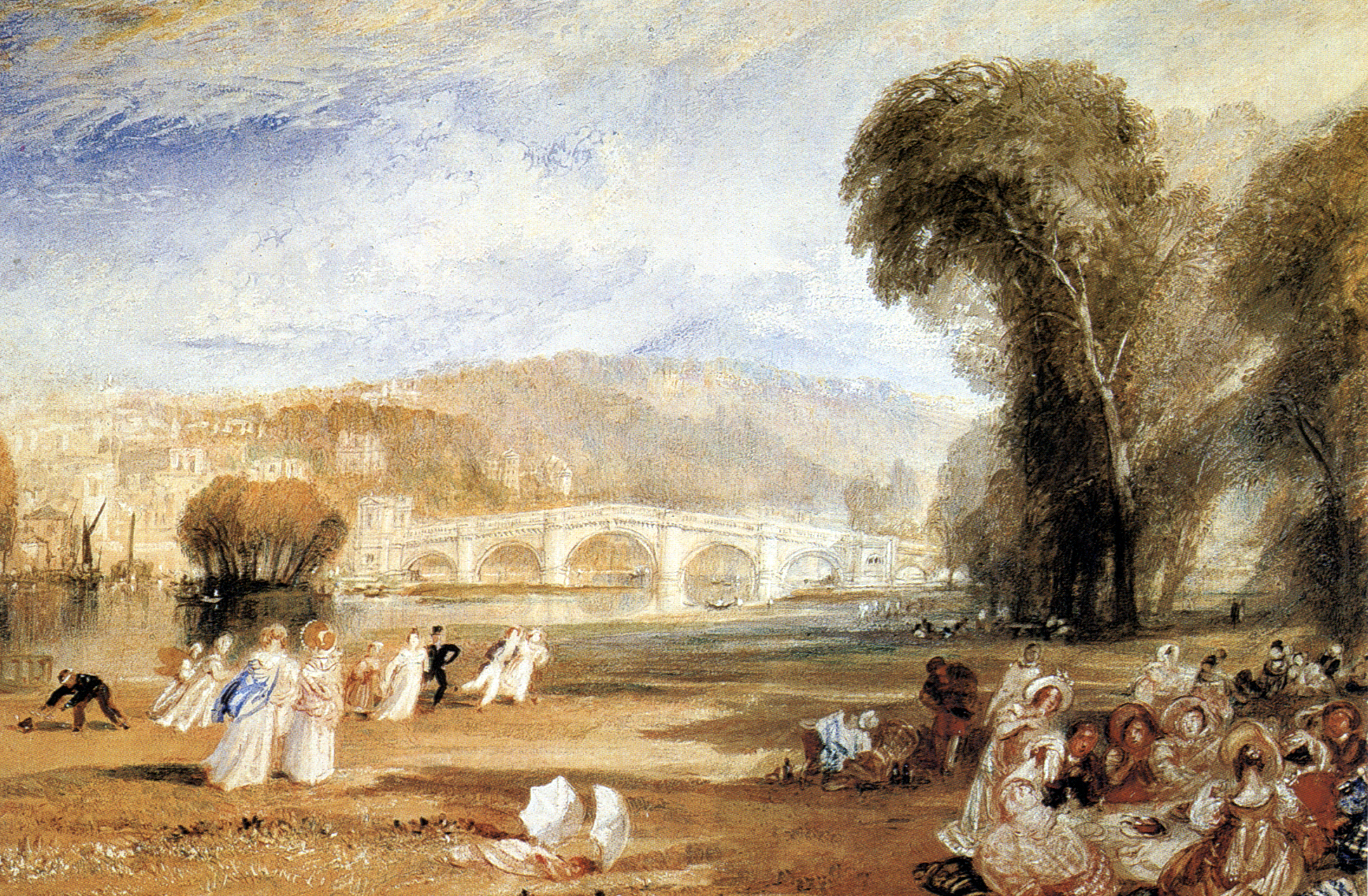 John Ruskin was introduced to Turner’s works when his father gifted him with the watercolor painting Richmond Hill and Bridge, Surrey (1828). According to the British Museum, the original title of the painting was Richmond Hill and Bridge, with a Picnic Party....
John Ruskin was introduced to Turner’s works when his father gifted him with the watercolor painting Richmond Hill and Bridge, Surrey (1828). According to the British Museum, the original title of the painting was Richmond Hill and Bridge, with a Picnic Party....
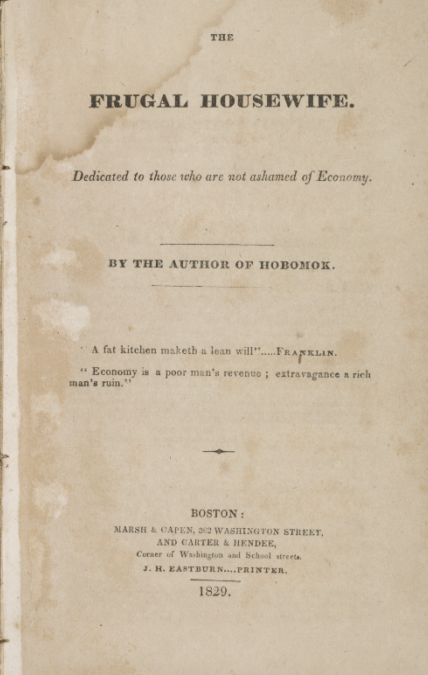 Child’s The Frugal Housewife is among the most popular American cookery and domestic manuals but has no specific recommendations for picnics. The 1830 edition does have a recipe for buffalo’s tongue; “Buffalo’s tongue should soak a day and a...
Child’s The Frugal Housewife is among the most popular American cookery and domestic manuals but has no specific recommendations for picnics. The 1830 edition does have a recipe for buffalo’s tongue; “Buffalo’s tongue should soak a day and a...
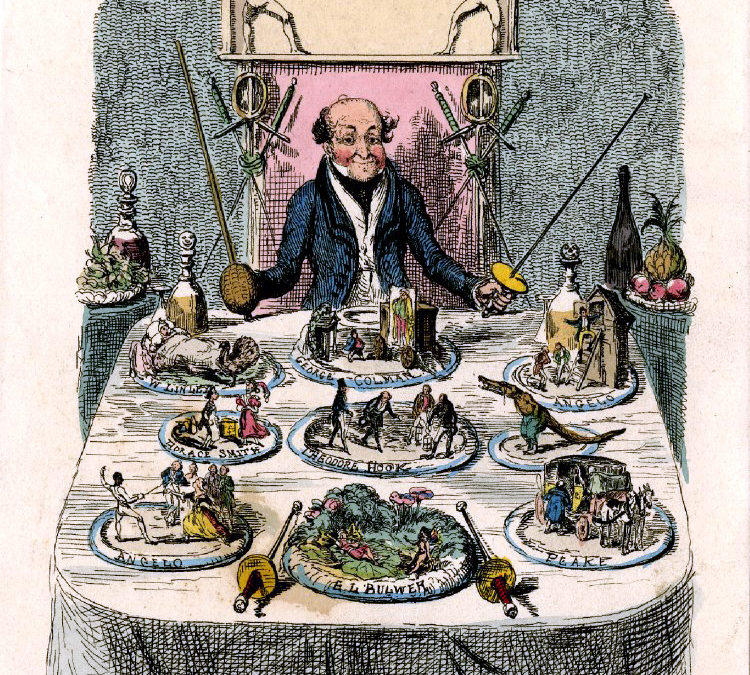 Angelo, London’s most renowned fencing master, was an original Pic Nic. His in Reminiscences of Henry Angelo (1830) is among the few first-hand depictions of the society. Angel explains that “the plan [for the Pic Nics] was derived from a friendly custom...
Angelo, London’s most renowned fencing master, was an original Pic Nic. His in Reminiscences of Henry Angelo (1830) is among the few first-hand depictions of the society. Angel explains that “the plan [for the Pic Nics] was derived from a friendly custom...
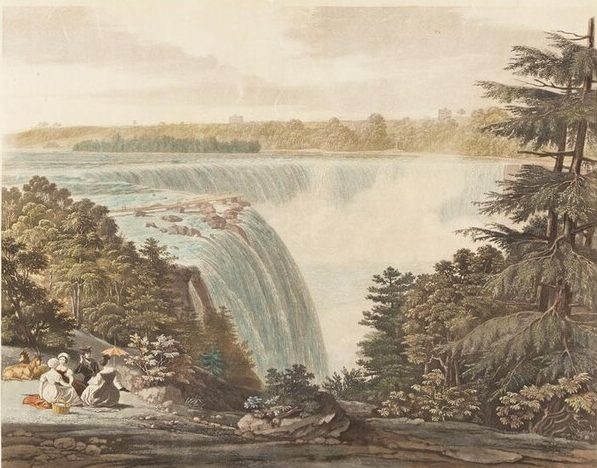 Bennett added picnickers to his Niagara Falls landscape to make the vastness of the falls seem more accessible. He placed a group of picnickers on Goat Island in the left foreground and positioned the falls beyond them. The inclusion of picnickers was pleasing and...
Bennett added picnickers to his Niagara Falls landscape to make the vastness of the falls seem more accessible. He placed a group of picnickers on Goat Island in the left foreground and positioned the falls beyond them. The inclusion of picnickers was pleasing and...
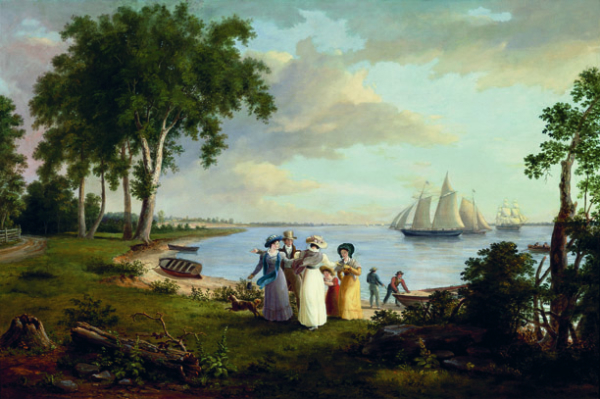 Birch’s View of the Delaware is a landscape embellished with a picnic party just arriving by boat to a destination on the shore near Philadelphia. See Thomas Birch. View of the Delaware near Philadelphia (1831), oil on canvas. The Corcoran Gallery of Art, Washington,...
Birch’s View of the Delaware is a landscape embellished with a picnic party just arriving by boat to a destination on the shore near Philadelphia. See Thomas Birch. View of the Delaware near Philadelphia (1831), oil on canvas. The Corcoran Gallery of Art, Washington,...
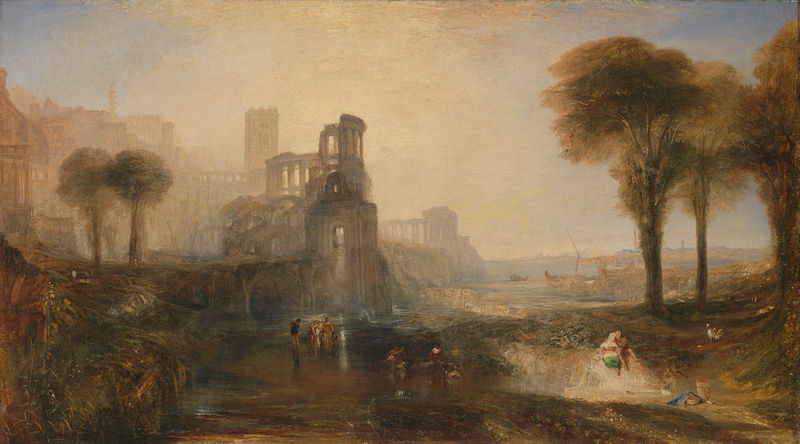 Among Suetonius’ apocryphal stories in The Lives of the Caesars (121c. CE) is Emperor Caligula’s three-mile bridge across the Bay of Naples from Baiae to Puteoli. It’s the kind of folly you associate with Caligula in one of his less savage moods, and...
Among Suetonius’ apocryphal stories in The Lives of the Caesars (121c. CE) is Emperor Caligula’s three-mile bridge across the Bay of Naples from Baiae to Puteoli. It’s the kind of folly you associate with Caligula in one of his less savage moods, and...
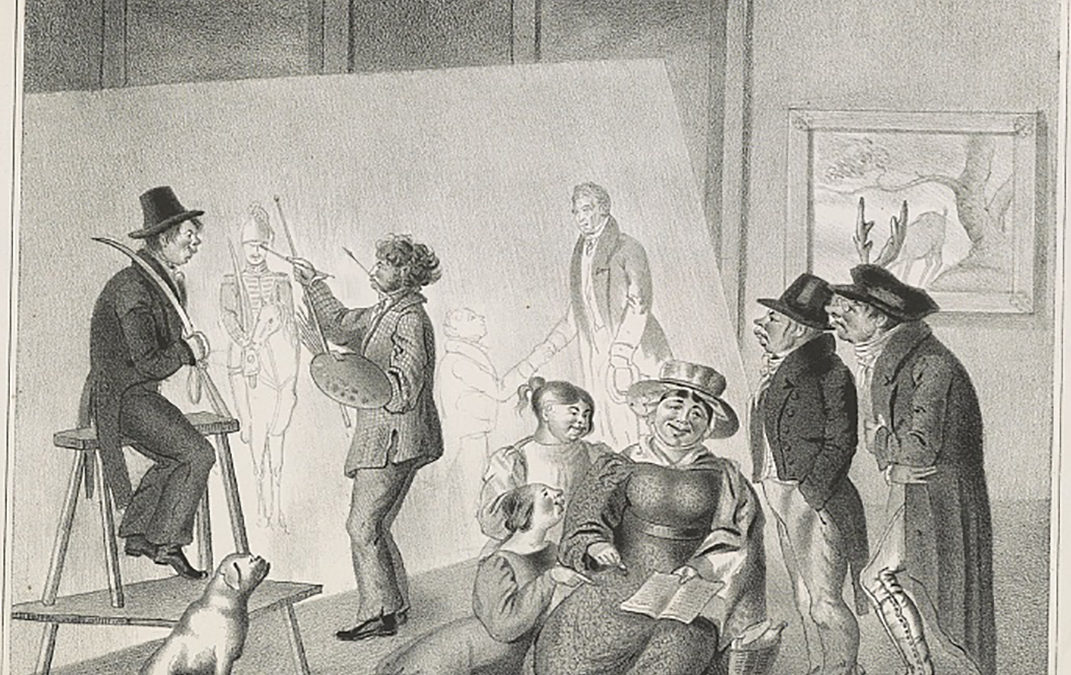 Sandwiches in the United States are mentioned first by Frances Trollope in Domestic Manners of the Americans. Their contents are unknown, and they were brought along for a hellish “pic-nic” party in the woods in the environs of Cincinnati circa 1829....
Sandwiches in the United States are mentioned first by Frances Trollope in Domestic Manners of the Americans. Their contents are unknown, and they were brought along for a hellish “pic-nic” party in the woods in the environs of Cincinnati circa 1829....
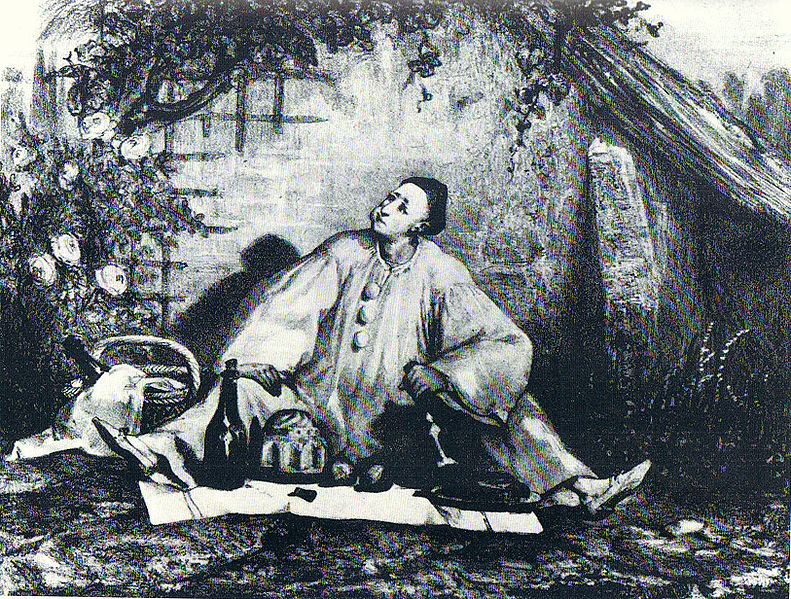 Bouquet’s Le repas de Pierrot, Pierrot’s Dinner, suggests a picnic. The scene depicts the actor Jean-Gaspard Deburau as Pierrot, a star stock character in the Théâtre des Funambules (Theater of the Tightrope Walkers). Pierrot always losses. From the look...
Bouquet’s Le repas de Pierrot, Pierrot’s Dinner, suggests a picnic. The scene depicts the actor Jean-Gaspard Deburau as Pierrot, a star stock character in the Théâtre des Funambules (Theater of the Tightrope Walkers). Pierrot always losses. From the look...
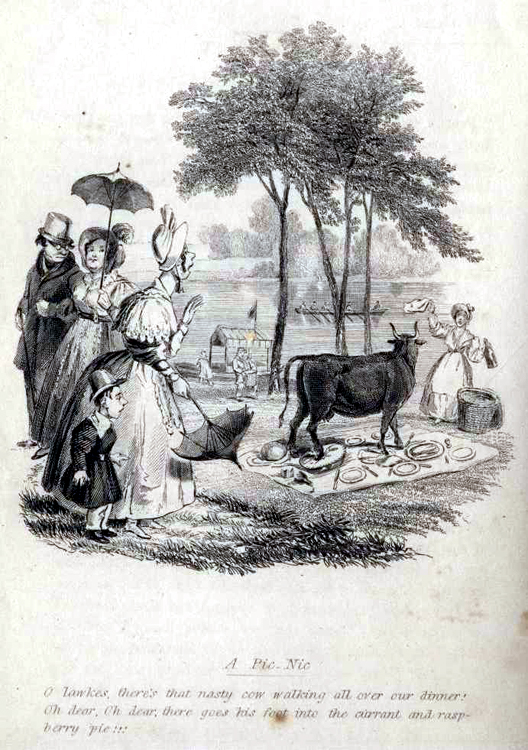 Robert Seymour’s “O lawkes, there’s that nasty cow walking all over our dinner!” (1834-36) Seymour was an illustrator, and cartoonist noted for his wit and humor. For his sketches, as opposed to a political or social cartoons. His preference is...
Robert Seymour’s “O lawkes, there’s that nasty cow walking all over our dinner!” (1834-36) Seymour was an illustrator, and cartoonist noted for his wit and humor. For his sketches, as opposed to a political or social cartoons. His preference is...
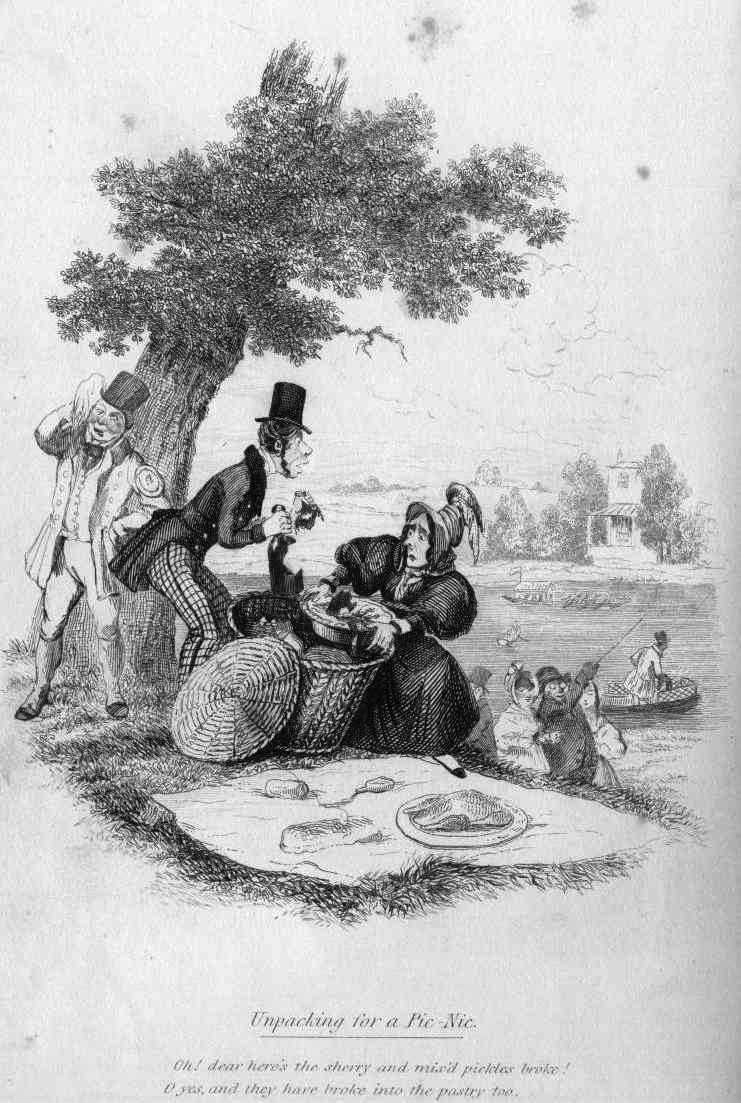 Seymour’s picnics sketches show a keen awareness of their potential for humor and satire. Especially if they’ve gone wrong. Unpacking for a Pic-Nic, for example, pokes fun at what breaks in a basket, as the legend makes amply clear, “Oh! Dear,...
Seymour’s picnics sketches show a keen awareness of their potential for humor and satire. Especially if they’ve gone wrong. Unpacking for a Pic-Nic, for example, pokes fun at what breaks in a basket, as the legend makes amply clear, “Oh! Dear,...
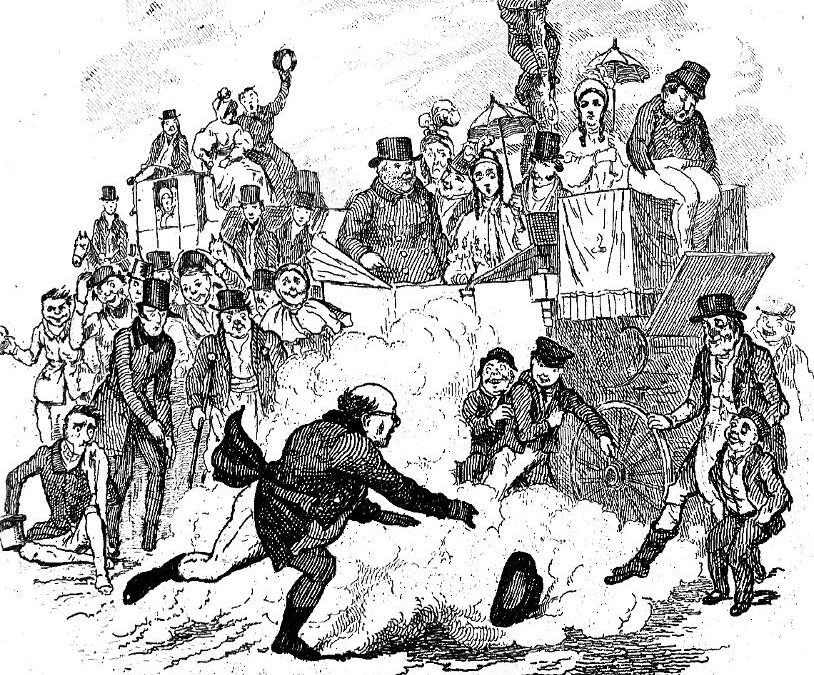 Dickens does not use the word picnic. But when the Wardles have lunch in their barouche, it’s an unmistakably a picnic: “In an open barouche, the horses of which had been taken out, the better to accommodate it to the crowded place, stood a stout old...
Dickens does not use the word picnic. But when the Wardles have lunch in their barouche, it’s an unmistakably a picnic: “In an open barouche, the horses of which had been taken out, the better to accommodate it to the crowded place, stood a stout old...
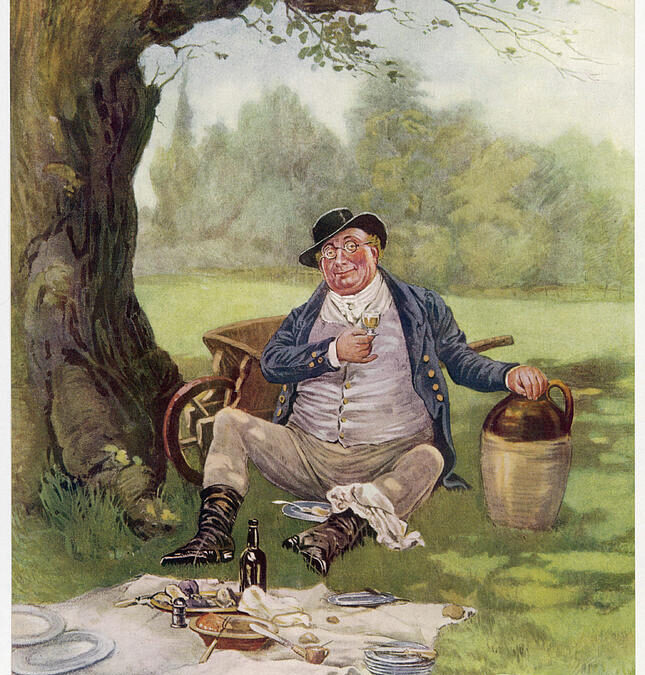 “A Pleasant Day With An Unpleasant Termination” is Dickens’s comic send-up of the Halt on the Hunt, particularly Jean-Anthelme Brillat-Savarin’s The Physiology of Taste, or Meditations on Transcendental Gastronomy (1825). Much of the comedy...
“A Pleasant Day With An Unpleasant Termination” is Dickens’s comic send-up of the Halt on the Hunt, particularly Jean-Anthelme Brillat-Savarin’s The Physiology of Taste, or Meditations on Transcendental Gastronomy (1825). Much of the comedy...
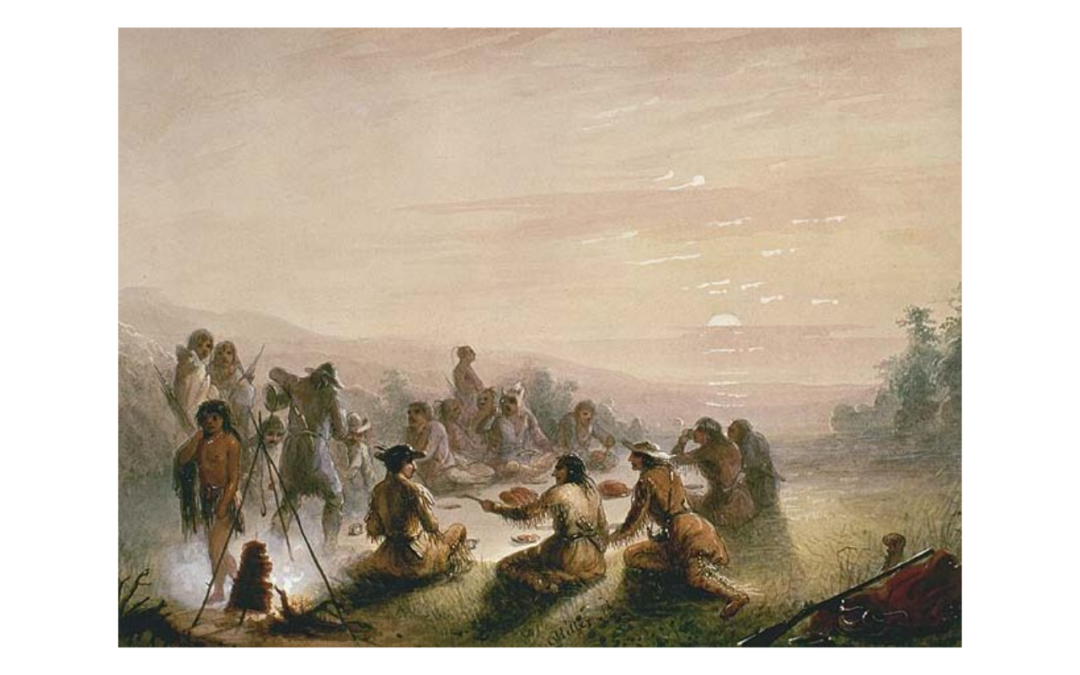 Miller’s in Breakfast at Sunrise looks picnicky, but it’s how adventurers and hunters dined in the wild. As a camp artist for Capt. William Drummond Stewart, a Scottish adventurer, Miller The hunters’ usual mess was served on a waterproof India...
Miller’s in Breakfast at Sunrise looks picnicky, but it’s how adventurers and hunters dined in the wild. As a camp artist for Capt. William Drummond Stewart, a Scottish adventurer, Miller The hunters’ usual mess was served on a waterproof India...
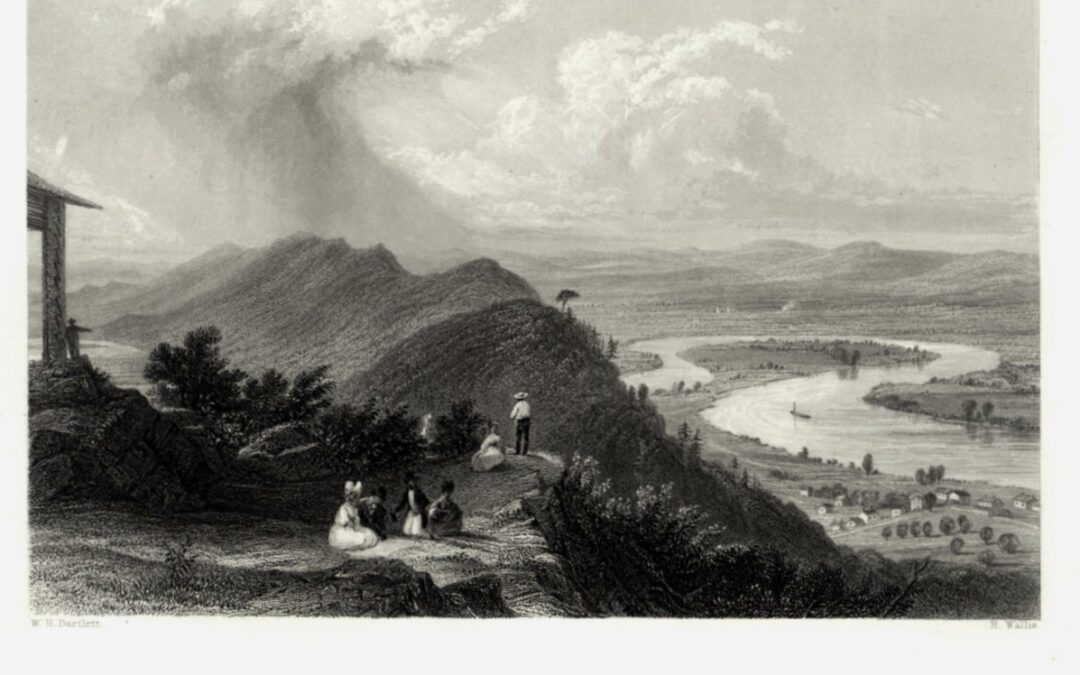 Bartlett was a British landscape artist known for his views appearing in picturesque travel volumes, including American Scenery: or Land, Lake, and River Illustrations of Transatlantic Nature. Each of the topographical landscape views was accompanied by Nathaniel P....
Bartlett was a British landscape artist known for his views appearing in picturesque travel volumes, including American Scenery: or Land, Lake, and River Illustrations of Transatlantic Nature. Each of the topographical landscape views was accompanied by Nathaniel P....
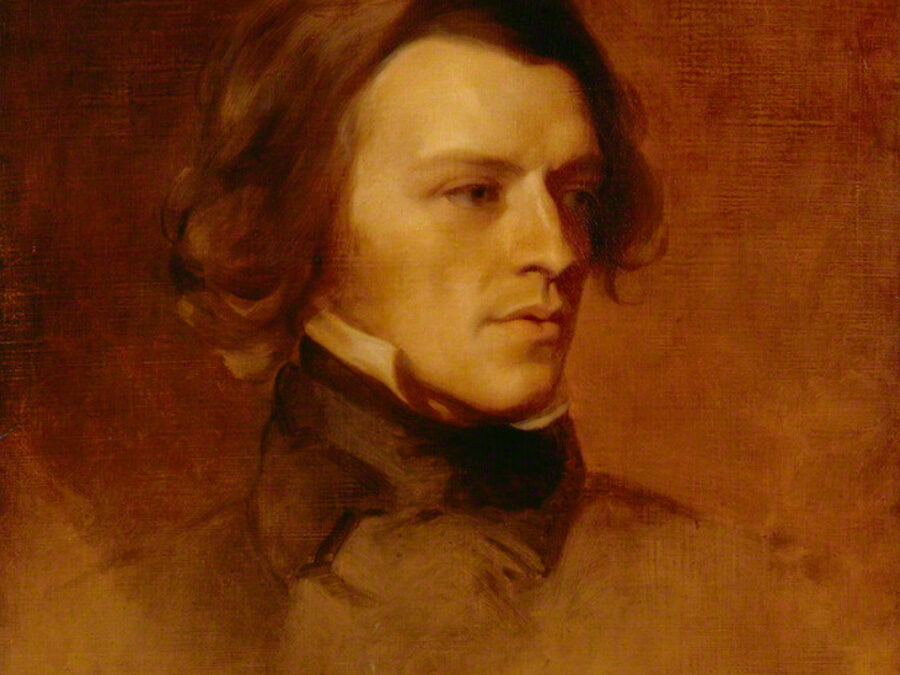 It’s one of Tennyson’s most popular shorter poems and is so sincere that readers believe Audley Court is a real place and search for it in the environs of Cambridge. The opening lines are among Tennyson’s most remembered. The Bull, the Fleece are...
It’s one of Tennyson’s most popular shorter poems and is so sincere that readers believe Audley Court is a real place and search for it in the environs of Cambridge. The opening lines are among Tennyson’s most remembered. The Bull, the Fleece are...





















